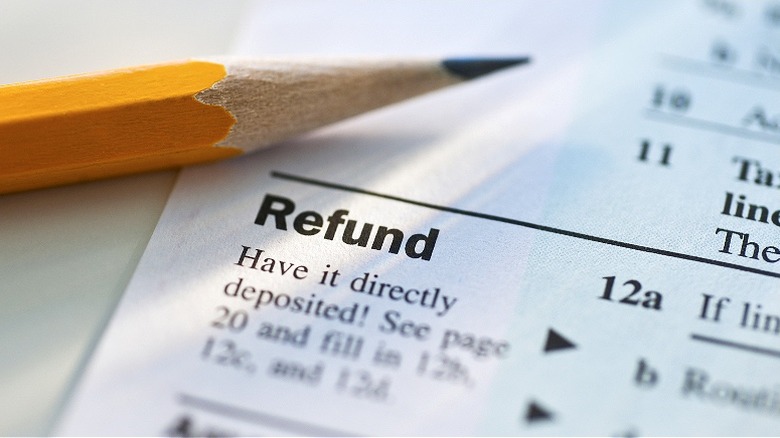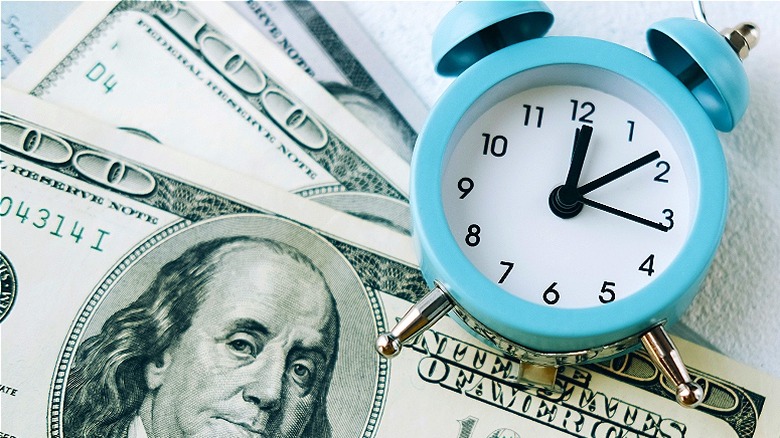Following This Simple Savings Rule Can Propel Your Net Worth To The Next Level
Building up your net worth isn't easy. The process takes dedication, time, and lots of hard work. Fortunately, there are a few key principles that make growing value in your investment portfolio an exponential endeavor rather than a linear slog that never gets any easier. Following a few simple savings rules can make this effort even more straightforward, even if they might not speed the process along at a rapid clip like you might hope.
Still, if you're already seeing a few of the signs in your financial habits that suggest you're above average in monetary management, it might be time to consider this additional step that can really supercharge your savings strategy. Utilizing a key feature of the world's wealthiest individuals' fiscal-management practices can make a huge difference in your everyday saving outcomes. What's more, unlike some of the habits that wealthy savers and investors have baked into their daily lives, this savings rule is one that virtually anyone can introduce into their money-management approach.
When you receive big payouts for any reason, it's crucially important to consider all the options available to you. Some might immediately think of ways the sale of a valuable item, tax refund, or bonus check can improve daily life. Meanwhile, a big enough payday might provide for the down payment on a new car or offer a way to fund a delayed home renovation project. But, a different approach altogether can breathe fuel into your net worth-building efforts if you opt to utilize it.
Save spending bonuses and surprise windfalls
Creating a plan is the first thing any consumer should do when they receive word that they'll be the recipient of a large cash infusion — perhaps it's an inheritance check, a big year-end bonus, or a solid tax refund. Without a plan, it can be difficult or even impossible to utilize these funds in a way that fully serves your needs and goals. The Financial Industry Regulatory Authority (FINRA) suggests taking care of "financial essentials," with a boosted savings account being a great priority for many. The more of this windfall you are able to save, the more distance you can put between yourself and the financial precarity of living paycheck to paycheck. FINRA also notes that traditional savings or investing isn't the only way that this money can work for you at its full potential.
For those with outsized debts, paying off a credit card bill or eliminating a large portion of an old medical debt, a personal loan, or other obligation can dramatically change your monthly budgeting considerations. Even a $100 monthly payment that suddenly disappears because you were able to pay it off with a bonus check can prove big when preparing your budget moving forward. Alternatively, consumers who don't have any sizable debts to consider will be best-served saving all or most of the money received. This puts you far closer to your savings goals, and in a major hurry, too. This isn't meant to suggest a windfall can replace your ongoing savings strategy, but rather act as a potent addition that helps you get where you're going much faster.
Your tax refund is a great example and opportunity
Saving your newly earned windfall might sound like solid advice that doesn't directly affect many Americans. Plenty of people don't work in fields or jobs that offer routine bonuses, for example, and inheritance checks don't come around without the rare grief that no one would wish upon another. However, your tax refund is a big "earnings" bump that happens on a regular basis.
Most Americans will see a refund come their way each year, and the average refund in 2024 was $2,850. Putting those thousands of dollars to work for you on a yearly basis rather than spending a refund on a shopping spree or translating the money into a different sort of splurge purchase (like a vacation or expensive event tickets and fancy dinners) can change the relationship you have with money for the better. Eliminating thousands of dollars in debt or adding most or all of this refund to your emergency savings puts a new and potentially massive gap between you and the unexpected things in life that can often keep you struggling to stay afloat.
Start early to get the most out of compounding interest
Perhaps the most important thing to note about this strategy is the value that early saving provides over contributions as you age. The younger you begin to prioritize large-scale savings the more time your money has to work for you. Cash invested in the stock market, for instance, tends to double on a timeline of about seven years; that is, money tied up in index funds that track with the market as a whole. Individual stock picks can speed this timeline along exponentially or reduce it in dramatic fashion based on luck, skill, and much more.
Investors looking to play the long game tend to utilize a mixture of both individual picks and stable investments like total-market ETFs to gain access to the best of both worlds. At any rate, by starting earlier, you give your money the best chance possible to increase its volume through the power of time and compounding interest — rather than increased principal investment that comes from your efforts directly.
Introducing this practice into your budgeting efforts as soon as you enter the workforce offers you plenty of additional years of weighty savings over another individual who might start intelligently investing their tax refund checks and bonuses at 30 or even later. Of course, you'll never be too late to start practicing this frugal strategy. However, the sooner you begin to prioritize your savings and financial future, the more money you'll be able to enjoy the benefits of later on in life when your savings and investments start to trickle back into your routine cash flow.



